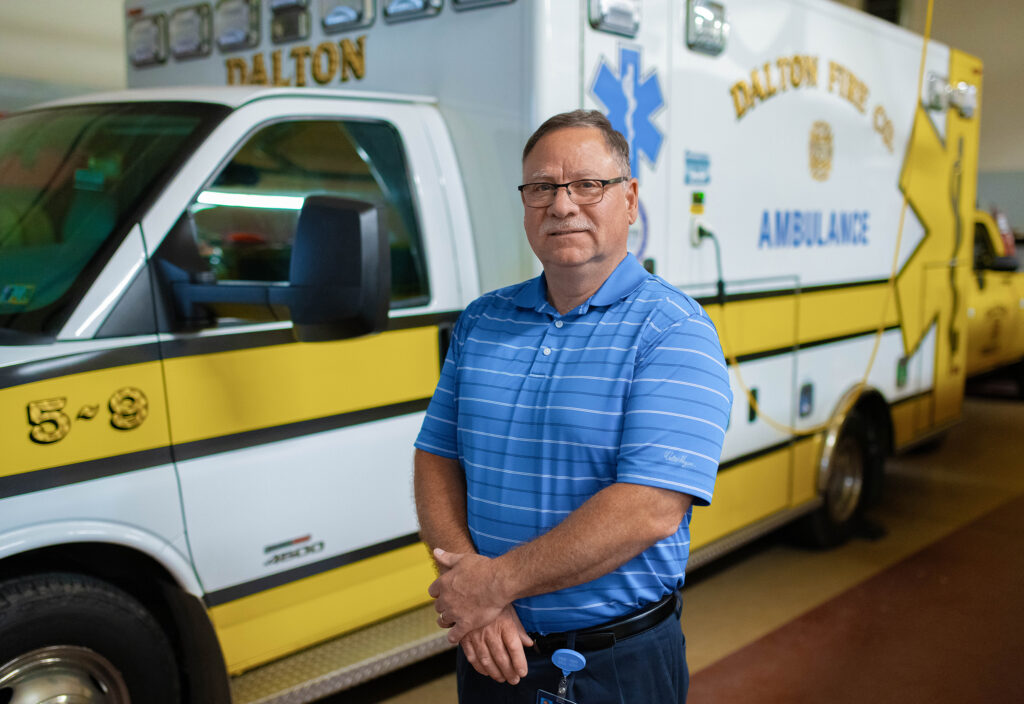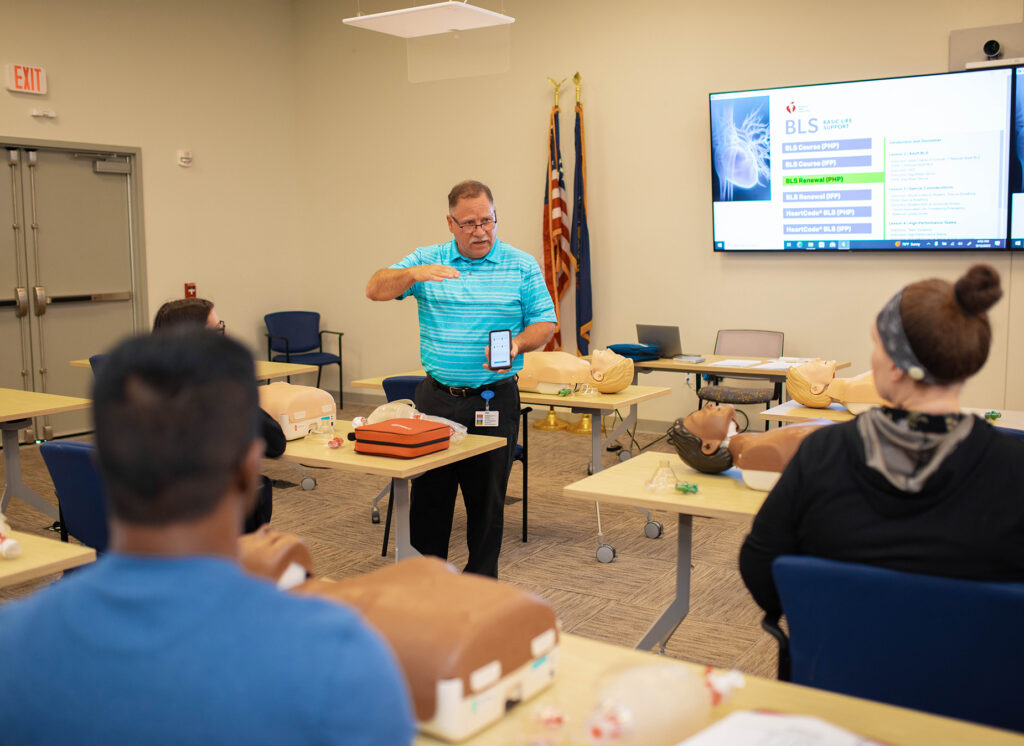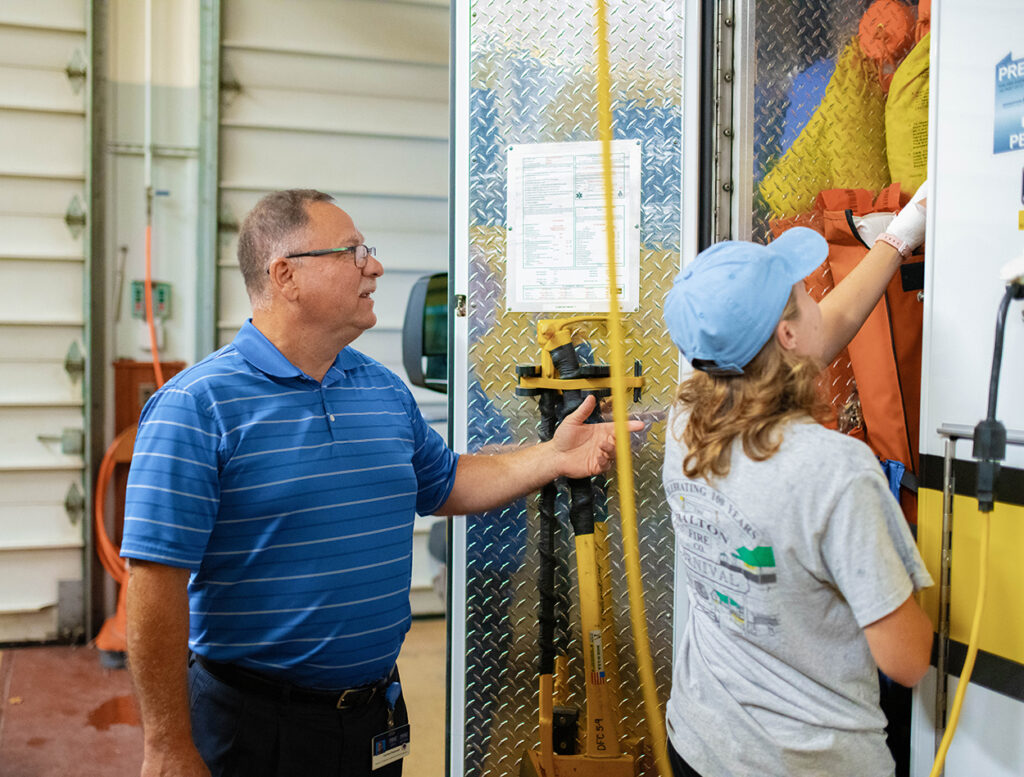News
The Wright Center becomes training site for life support

Carmen Passaniti, a veteran paramedic and longtime volunteer with the Dalton Fire Co., joined The Wright Center for Community Health as its director of employee health and continuing medical education coordinator. The post allows him to pursue his passion to serve the community by spreading knowledge about CPR and other life-saving techniques.
The American Heart Association-designated site will offer CPR and related courses to professionals and people wanting skills to respond in cardiac emergency
Longtime paramedic Carmen Passaniti knows that saving the life of a person in cardiac arrest often depends on what happens even before emergency responders arrive on the scene.
“If someone doesn’t start CPR,” he says, “the chance of a successful outcome is very, very small. Without that early intervention – without basic life support – nothing really matters.”
Passaniti recently joined The Wright Center for Community Health, where he is leading an effort to provide various levels of life support training to anyone in the region who wants or needs it, ranging from hospital and health center employees to people with no connection to the medical field.
The Wright Center recently became an American Heart Association (AHA) training site, allowing it to begin delivering important services to the communities it serves in Northeast Pennsylvania. For professionals who are required to get certifications and recertifications, it will provide affordable trainings in Basic Life Support, Heartsaver CPR, Advanced Cardiovascular Life Support (ACLS), Pediatric Advanced Life Support (PALS), and Pediatric Emergency Assessment, Recognition and Stabilization (PEARS).

At the American Heart Association training site operated by The Wright Center for Community Health, the aim is to provide life support training to anyone in the region who wants or needs it. In addition to Basic Life Support, there will be courses for professionals who require certification, or recertification, in Advance Cardiovascular Life Support, Pediatric Advanced Life Support and other levels of training.
For beginners, Passaniti will cover topics such as how to identify the signs of sudden cardiac arrest and how to use an automated external defibrillator, the device used to jolt a heart back into rhythm. All trainings will adhere to the AHA’s training site guidelines, which are widely considered the gold standard.
By establishing the new training site, The Wright Center will be able to efficiently certify and recertify its own employees, including physicians, nurses, and other clinicians, while addressing broader community needs.
A well-established AHA training center in Lackawanna County recently ended operations, leaving emergency responders, college students enrolled in health care programs, daycare workers, pharmacists, and others searching for options.
The debut of The Wright Center’s training site also coincides with a surge in public interest in CPR certification programs. A high-profile incident involving NFL player Damar Hamlin, who was resuscitated on the football field during a nationally televised game in January, brought the reality of cardiac arrest into people’s living rooms.
“When it happens in a very public venue such as a Monday Night Football game with millions of people watching, it kind of brings more people to the classroom,” says Passaniti. “They say, ‘Maybe I should learn how to do that.’ Because it can truly make a difference.”
Hamlin, who survived the incident and has since resumed playing, has partnered with the AHA to issue a social media challenge, the “Damar Hamlin #3forHeart CPR Challenge.” The campaign urges participants to do three things: learn “hands-only” CPR, donate to AHA in support of CPR education and training, and encourage three friends to do the same.
Any first-timers who attend Passaniti’s basic-level training courses are coached in not only the skills they need but also the confidence. Many novices are understandably concerned that if they help a stranger in an emergency, they might do more harm than good. Others worry they might expose themselves to legal liability. Passaniti explains there are Good Samaritan laws in each state to protect helpers, and intervention is crucial for these life-and-death situations.
“Anything you do is a positive,” he says. “People may be worried about doing the technique wrong, they’re worried about causing injury. But it’s better to try. Some CPR is better than no CPR.”
More than 350,000 cardiac arrests occur outside of hospital settings each year in the United States, according to the AHA. Yet in only about 40 percent of those cases do the victims get the immediate help they need before the arrival of emergency responders.
CPR, if administered immediately, can double or triple a person’s chance of survival, according to the AHA.
That’s why people like Passaniti are eager to spread training throughout the community, increasing the odds that life-saving help might be close at hand when needed at homes, houses of worship, workplaces, sports fields, and other social spaces.
‘Chain of survival’
Passaniti, 65, seems perfectly suited for his new role at The Wright Center, where he works among many familiar faces.
“I’ve known Carmen for years,” says Sheila Ford, vice president of quality, safety, and enterprise policy compliance and integrity. “All of our doctors know him. For decades our physicians and residents, as well as clinical staff, have received BLS, ACLS and PALS training with Carmen.”
“Carmen, has just been a pillar of the community” she adds, “Our clinicians value his expertise with the American Heart Association’s gold standard for life support certifications. Creating a clinical community gold standard is important for the patients and the communities we serve.”
In 1972, at age 14, he became a junior firefighter for the Dalton Fire Company, where he continues to serve to this day as ambulance captain. In both volunteer and paid capacities, he has devoted decades to protecting lives and property. He served as a paramedic in Lackawanna County during the pioneering days of the profession. In addition to responding to calls, he then became active in managing training programs to properly prepare others who work in the emergency response field throughout Northeast Pennsylvania.
Passaniti now holds the title of director of employee health and continuing medical education coordinator at The Wright Center. His duties include overseeing the health aspects of the new employees’ onboarding requirements and ensuring employees remain up to date on health mandates such as vaccinations.

At age 14, Carmen Passaniti joined the Dalton Fire Company as a junior firefighter. Today, at 65, he continues his track record of volunteer service with the organization as its ambulance chief, helping to train and nurture the next generation of selfless community servants.
He will also spearhead a two-year effort to have The Wright Center’s new training site designated as an AHA training center, a distinction earned by training a certain number of people annually and meeting other standards.
“Carmen is so passionate and committed to it,” adds Ford. “And he’s done this before. This is not a road he hasn’t traveled.”
Passaniti was deeply involved in managing the former Community Life Support ambulance company and the recently closed Commonwealth Health EMS (CHEMS) training center, where he had been clinical manager.
Even as he reaches an age at which many people opt to retire, the West Abington Township resident feels compelled to continue to conduct trainings, so he can teach and inspire younger generations. “It’s something I truly enjoy doing,” Passaniti says.
He also knows that, for some of the people he trains, there will be more at stake than a feeling of accomplishment or a certification. A life will hang in the balance. A fast-acting family member or bystander will step in, use their training, and forge the first link in a so-called “chain of survival” that begins with basic life support and connects to skilled emergency responders and, finally, to hospital professionals.
The outcome, while never certain, can be spectacular.
“Someone is going to see their family again,” says Passaniti. “They’ll leave the hospital neurologically intact and go home with the same quality of life.”
For information about life support training available through The Wright Center for Community Health’s AHA training site, contact Carmen Passaniti at passanitic@TheWrightCenter.org or call 570-335-3307. Training is available in the communities The Wright Center serves in Northeast Pennsylvania.








